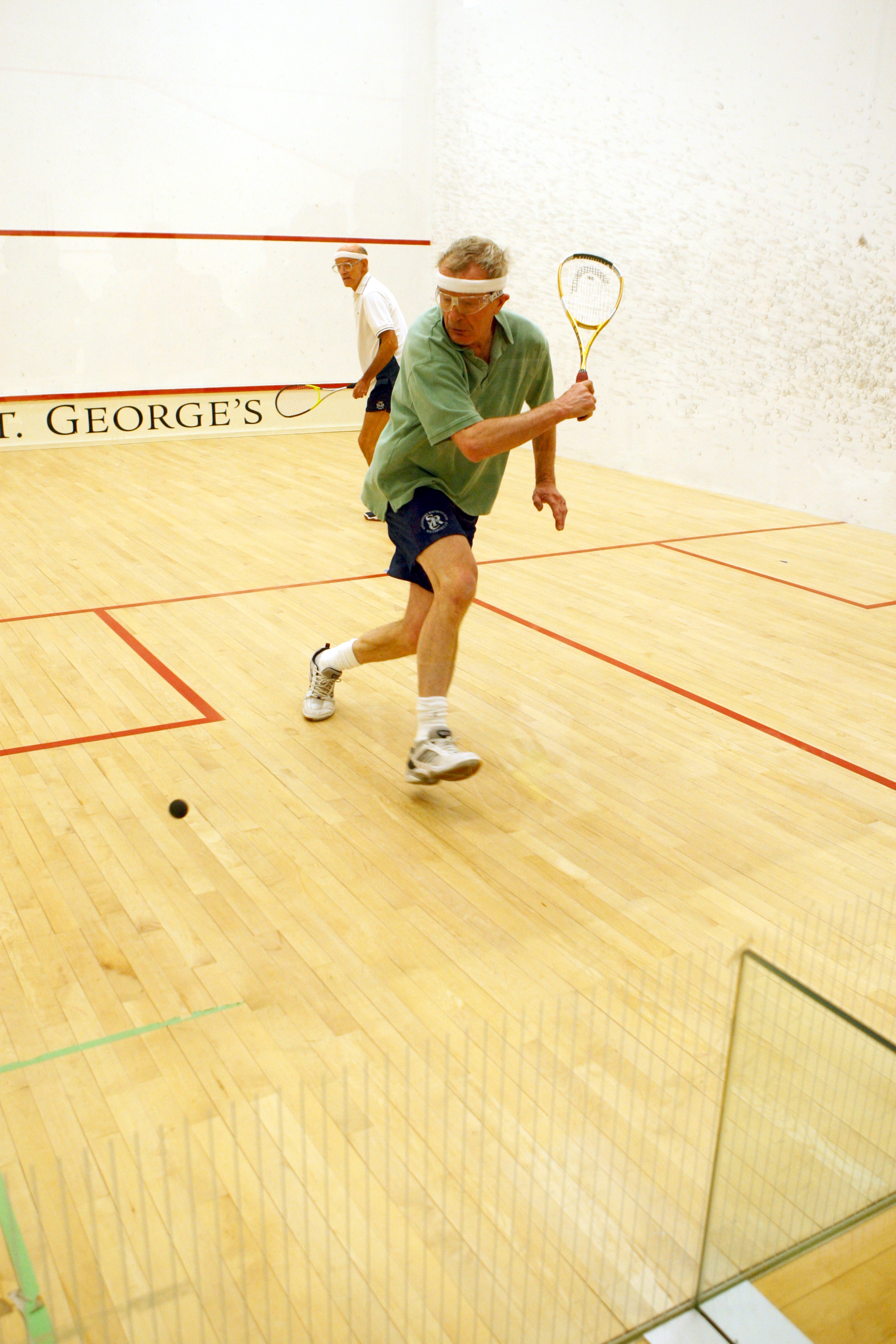By Richard Millman, Director of Squash, Kiawah Island Club
Your understanding of the game of Squash is often filtered through the first explanation of the game that you ever heard. This can help or this can harm.
Language is a powerful tool—both for good and bad. So if the initial explanation of the game that you receive is off target, you can easily be misdirected.
Here is my concept of the game—very much my personal bias—and I present it here as food for thought. In my view no one should accept advice because of the authority (or lack thereof) that promotes it, rather because the ideas are logical and make sense. That’s the only way you will have the confidence to use them in the heat of battle.
For the sake of clarity I am going relate what goes on in a game of Squash to the human skills that the sport both requires and helps to develop.
Unlike any other ball sport, Squash requires and hones the very assets necessary for the survival and success of the “human animal.”
In fact, contrary to the negative claims of various misguided academics who, from time to time, throw down narrow-minded criticisms of athletes from the rarified atmospheres of their ivory towers, Squash educates the human animal better than any purely academic field of study.
Why is it that colleges with student athlete populations of 10 or 11 percent rely on that very 10 or 11 percent to provide, as alumni, 33 percent of the annual giving? Where would the academic research programs of leading institutions be without athletes?
Bankrupt I would suggest.
Could it be that what the athlete learns educates them for survival and success more than pure academia?
Frankly the health benefits of sport, while important, are only a by-product. The real value is in the development of human beings in preparation for real life.
So why is sport treated with such little credibility as a field of learning? Are the occupants of the ivory towers perhaps a little afraid that the game is afoot?
Of all the athletic pursuits, none is as educational as Squash.
If we go back 10,000 years and place an adult human being in an unknown jungle and leave that individual there to survive—what would be the behavior required in order to survive and thrive?
The most apt description of that individual would be to describe them as a hunter.
And what are the essential characteristics of a hunter? First and foremost, they are those of self-preservation.
If you don’t survive, you don’t eat—simple. So the self-preservation instinct has to top all others.
What assets are required for self-preservation?
Well-honed senses—both primary and peripheral. Consider the Bat. Using its primary focus, it might zero in on a juicy Moth but if its peripheral sensitivity doesn’t pick up on the Owl in the tree to its right then not only will it not get the Moth, it will become dinner for the Owl.
Our Human must do the same. It might have great desire to hunt the Deer or the Rabbit it suspects is in the jungle, but what of the Leopard that is lying in wait?
Caution, stealth, wariness, knowledge of the environment, experience dealing with attacks and counter attacks, strategy, feints and deception, physical fitness, mental fortitude, total focus and ability to over-ride distractions, multitasking skills and an ability to deal with changing circumstances.
Preservation of the self is a must. But this is not a purely defensive attitude. By guaranteeing your own position of strength, the opposition is often placed at a disadvantage by default. Any combatant that focuses primarily on attack and forgets to secure their own position will find themselves exposed and vulnerable.
And so by focusing on self-preservation and having secured your self first, offensive options abound—providing you don’t sacrifice the advantage position.
Let’s apply this to Squash. Most individuals, when asked what their primary reason is for hitting a shot, reply something like: ‘To hit the ball where the other player isn’t,’ or ‘to win the point.’
Immediately we can see the flawed logic in this theory as neither of the statements describes any sort of self-preservation.
Admittedly most players when asked what to do after they have played the shot say something like, ‘get back to the T,’ usually because they have been told to do so and have some vague notion that the T is a place of safety.
This theory is a disaster.
Firstly, it encourages the player to consider self-preservation after the event—slamming the barn door after the horse has bolted. Secondly, it encourages the player to divert their primary attention away from the source of danger (the ball) and direct their focus to a piece of red paint. Thirdly, this advice gives the red paint an entirely inflated and false position of importance—giving the impression that you are safe there and can relax, which usually leads to the player decreasing their mental, physical and emotional attention at precisely the moment the opponent is striking the ball.
To transfer it to the jungle angle, it would be like attacking the Leopard without thinking through your safety and then having conducted the attack returning to a rock that someone had told you was safe and you had entirely believed without checking yourself, only to find that while you drop your guard on the rock of safety, the Leopard has easily snuck round behind you and attacked.
What would your epitaph be? Perhaps: ‘Someone told me I would be safe there and so, without thinking to check it out and completely forgetting to keep my focus on the Leopard, I took it for granted that everything would be OK.’
What then? Do we avoid contact with the Leopard? Absolutely not. The Leopard is between success and us. We must destroy him if we are to be the Lords of the Jungle. So we devise a plan that puts us in a position of strength and then we attack, but we never let our guard down. Our peripheral sensitivity provides us with continuous perception of our surroundings, always asking ourselves: ‘is there another threat?’
The primary focus—mental, physical and emotional—remains absolutely focused on the immediate problem (in the Jungle, the Leopard; on the Squash court, the ball). We carefully construct an attack, always considering our own position first, but having made that provision, we go onto the offensive.
Squash is primarily about putting yourself in a good position. To do that you need mental, physical and emotional assets that help you. Those assets can be pooled into Technical, Tactical, Physical and Psychological areas of development.
These skills required in these four areas are dictated by our purpose. Mechanics, strategies, fitness systems, physique, and mental training must all be governed by the overriding principle of the game.
If the systems used to teach become more important than their original purpose, players become sidetracked. We must not allow ourselves to be blinded to the forest because we are so intent on individual trees. While we are trying to develop these assets, it is very important that we continually remind ourselves of our purpose: Survive.
Prosper? Yes. Succeed? Yes. Win? Yes.
But try to do these things from an insurmountable, defensible position that you consider before you attack. And never, never, never sacrifice your ability to maintain security…or you will be someone’s dinner.
Next month: Developing Assets—the mechanics of technical skills





